The Save Water Save Earth movement has been growing as the importance of water conservation has become more and more apparent. Our “Blue Planet” is made up of about 71% water. But did you know how little of it is actually accessible? Water is a seriously limited resource. Less than 1% of all the water on earth is usable. That’s why the importance of water conservation needs to be at the forefront of our minds when traveling.
This guide reviews the need for saving one of the most important resources on earth. Looking specifically at water conservation tips whether you are at home or out and about (where the water supply may be scarce).
Table of Contents
Save Water Save Earth
Let’s talk about the importance of water conservation. Clean water is hard to come by. The need for clean, freshwater around the world is increasing on a daily basis as our global population explodes.
Our water resources are already under significant strain and the likelihood that future generations have access to water is dwindling fast. Saving water on simple daily tasks now will have a huge impact on not only the planet’s wellbeing but also on the people around the world already in serious shortages.
Water Quick Facts
“97% of the earth’s water is found in the oceans (saltwater, not suitable for drinking, growing crops, and most industrial uses except cooling).”
“3% of the earth’s water is fresh.”
“2.5% of the earth’s fresh water is unavailable: locked up in glaciers, polar ice caps, atmosphere, and soil; highly polluted, or lies too far under the earth’s surface to be extracted at an affordable cost.”
“That leaves approx. 0.5% to 0.7% of the earth’s water which is available, fresh, and usable.”
Bureau Of Reclamation
The supply of this usable water is continually collected, purified, and distributed in the natural hydrologic cycle (rain to rivers/ocean, evaporation to clouds, and rain again, etc).
Why Is Wasting Water Bad?
Wasting water does not really remove water from the continual cycle. It does, however, remove it from our small portion of readily accessible, useable water. Basically, water needs to be treated, transported etc. to get to our taps. This uses energy. So really, you’re not only wasting available water, you’re wasting energy.
“Even though fresh water may be plentiful in a certain region, it may still need to be cleaned of dirt, microbes, and minerals; and then pumped through pipes to the buildings. For this reason, an area may have abundant water resources but may still have to be careful about conserving water if it has inadequate infrastructure.”
WTAMU
The importance of water conservation is not only a question of saving water. It relates to your reducing your carbon footprint.
Water Source
When a community runs low (or out) of water usage, it can lead to starvation, famine, disease. This puts pressure on surrounding areas with water sources (and the world as a whole). Cape Town, South Africa was on the brink of running out of water this year. The whole city. Out of water!
Other Species Need Water Too
We think about usable water as usable for us. But there’s a whole ecosystem relying on the same 1% of water that we are. Overuse on our behalf can lead to environmental starvation.
In many places, it already has. Let’s prevent further damage, especially when we travel to these places. Knowing how to save water save earth while traveling is an essential part of eco travel.
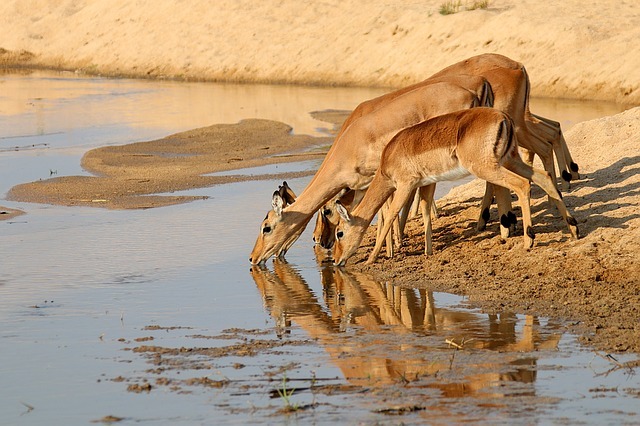
The Water You Use, But Don’t See
A big reason for the importance of water conservation is the water you don’t see. We use water for just about everything but most of our water gets used without us even seeing it.
The distrubition of water is generally broken into three catagories:
- Agriculture – water needed to grow food, support livestock, etc.
- Industrial – water needed to make items (a t-shirt made from cotton needs water to grow the cotton, etc)
- Domestic – water we used in households in our daily lives (showering, drinking water etc.)
The breakdown is variable on a number of factors, however is approximated as follows:

Basically, the amount of water we’re using in our daily lives (for domestic things like washing etc), is only a very small percentage of the water we are actually using.
What Is My Water Footprint?
Most things in our modern life use water in some form or another. It takes water to make food, clothes, industrial products, etc. The amount of water used to make each product has been calculated by the Water Footprint Network.
The total footprint considers all water used in the process to get the item to you. The numbers may vary depending on circumstances, however, they provide a tangible scale for comparing goods and services across a wide range of industries. It’s pretty shocking how the numbers stack up.
How To Save Water Save Earth
While the information mentioned so far may seem overwhelming; it does make a few things clear. The importance of water conservation is serious, we need to save water save earth.
Conserving water is about choices.
Just being aware of the fact that most of the water you “use” is actually done without you even seeing it, which means that you can begin to choose things specifically with water in mind. Knowing that the importance of water conservation is due to a collection of factors will ensure your ability to make the right decisions when you aim to truly save water save earth.
You can’t stop eating food or buying things in your life that you need. You can, however, make choices to reduce your overall water footprint. Here are the 5 best ways you can reduce your water footprint.
1. Minimalise
It’s clear from the water footprint numbers that “stuff” can really add up.
Borrow or rent gear
Going on an island holiday? Check before you go if you can rent snorkel gear instead of buying a set to take with you. It’ll save you money, carrying weight, and a significant water footprint.
Going on a hiking trip? Check online, some local shops may offer hiking gear for rent. Again, saves cost, weight and water.
Sustainable clothing
People have a tendency to buy new clothes for a trip. If you’re going to do so, why not do it in a more sustainable way to reduce your waterfootrpint.
There’s so many options now:
- vintage stores
- clothes made from organic and natural fibers and dyes
- clothes made from recycled plastics and fabrics
Check out our sustainable fashion for travel guide for tips on how to make the switch.
Keep It Minimal
I’ve been living out of a backpack for 10 years now. There’s a rule that I’ve applied to myself. If it doesn’t fit on my back, I don’t need it.
In this backpack I’ve got all kinds of things. Work clothes, going out clothes, swimwear, etc. Admittedly it is easier for a guy (so I’ve been told). Nevertheless, keeping a minimal life is not only stress free but good way to conserve water.
2. Watch The Water You’re Eating
Compared to all the other domestic activities we do (showering, flushing the toilet, brushing your teeth, etc.) our diet makes up by far the most of our total water footprint. Therefore the importance of water conservation in your food is essential.
To put it into perspective, 2,450 litres/660 gallons of water (enough drinking water for 3 years), can be used in one hamburger, or 12 eggs.
Consider the water in your meal
It is not a question of dietary requirements or preference. Whether you want to eat meat, or be vegan is up to you. Simply looking at the best way to save water; cutting out a significant amount of meat from your diet is the easiest way.
It can be difficult when you’re travelling as you have to rely on what’s available. You can, however, make considerations and plan ahead.
In general, the best way to reduce your waterfootprint is to reduce your meat intake. However, if you’re going to eat meat, eat local to reduce transportation (reduce your carbon footprint) energy and support local communities.
Snack healthy
You’ve been travelling for hours, you’re tired, you want something easy. You get off a plane, a bus or a train and boom; there’s a row of fast food joints. This is not by chance. They know people want something quick and easy.
If you really want to save water. You could consider, forgoing the burger and eating a snack. For example, sunflower seeds are cheap, they also use one of the smallest amounts of water per volume to grow (nuts actually use quite a lot, so any seed is better).
If you’re thinking about taking a chocolate bar on your trip – chocolate’s actually higher than beef in water used to volume! Sorry).

3. Save The Water You Can See
It might seem like saving water is really out of hands, with nearly 90% of our water footprint taken up by things we can’t see. But it’s not all over.
A great example is Cape Town, South Africa. Cape Town, has been under the threat of running out of water this year. Running out of water. Literally, you turn the tap and there’s just nothing there!
They brought in some pretty tight measures to reduce everyone’s daily domestic water usage to 50 litres (13 gallons) per person per day. The significant reduction in water use by the city’s people meant that they pushed back the “day zero” (day of running out of water) long enough for rains to refill the dams and reservoirs.
The city is safe for now. But water shortage is a real threat again for the near future. This example shows that our domestic use, when limited, can really make a difference to a whole city.
4. Saving Water When You Travel
Here are some simple ideas to help save the water you can while you’re out and about traveling the world. Even though you may not be paying the water bill while on the road, the earth still pays.
Eat more plant based
Choosing to eat more plant-based meals is a great way to save water save earth. As the meat and dairy industries have such a large carbon footprint, changing your diet can make one of the biggest impacts.
Avoid Plastic, choose Zero Waste
Even if you just focused on water (not considering pollution), it takes twice as much water to make the plastic bottle that it’s in. So reusing your water bottles makes sense from a saving water perspective too. By choosing reusable and leading a more zero waste lifestyle, you will reduce your water footprint.
Fix or let someone know about a leak
Went to use the bathroom and noticed a leak? A lot of the time people don’t even realize. A dripping tap (one drip per second) can waste around 7,500 litres/2,000 gallons a year! By letting someone know, you might have ended that leaks life.
Re-wear it. Change accessories not clothes.
Unless your clothes are dirty or drenched in sweat, you can re-wear stuff on the go.
If you’re out exploring new cities or new landscapes and you’re worried about getting caught out wearing the same clothes in your travel photos, mix up your accessories instead of changing clothes. Try a different hat, scarf, necklace, sunglasses… get creative.
Spread Awareness Of Saving Water
A lot of the time people are generally unaware of what the real cost of water is, though are generally interested to hear about it. Some simple facts or ideas can change a person (or a communities) way of living. There are plenty of good save water slogans on this to help spread the word.
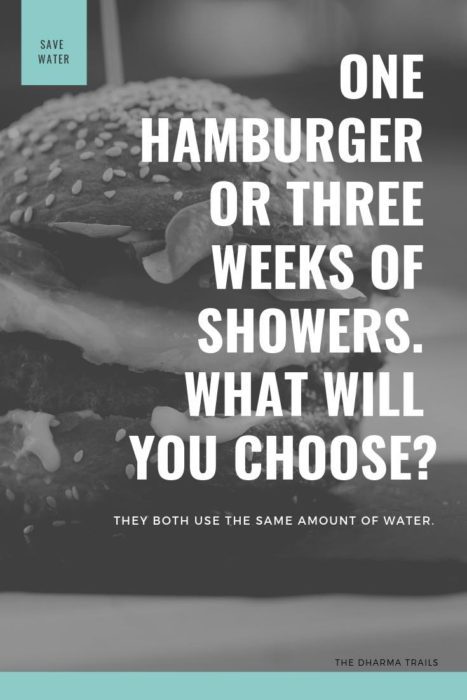
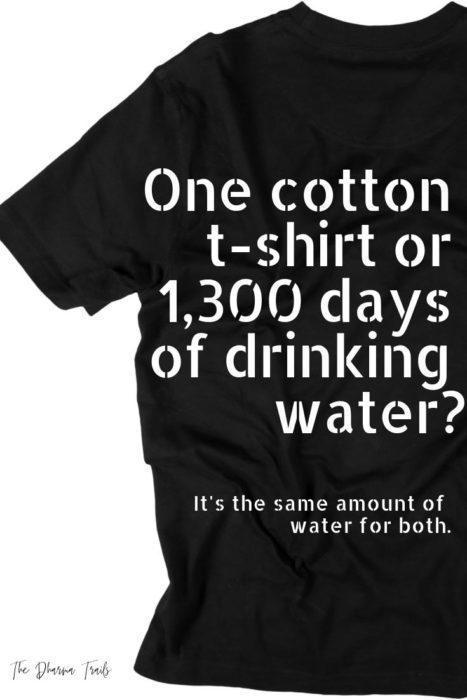
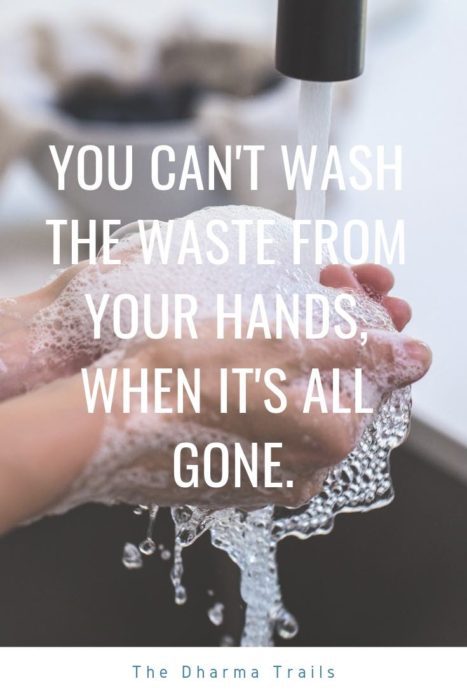
5. Where you’re staying
It doesn’t matter if you’re in a hotel, a hostel, a house or a camp site. There are always ways to save water when travelling. Opting to stay at eco resorts or lodgings can be a good way to reduce your water use on the road. Find eco hotels and accommodation, here!
Showering uses less water than baths
Assuming you have a 5 minute shower or less. If you’re a couple, shower together. Or if you’re single and lucky enough, find someone to save water with together. We keep a bucket in our shower to catch the leftover water, which then is used to water our garden.
Turn off the tap while brushing your teeth
Not sure who doesn’t do this…but if you don’t, you could be wasting about a week’s worth of drinking water, each brush.
Get clean in a stream (or sea)
A lot of people when traveling tend to go near some kind of water source. We typically end up near a beach (if not on one). We tend to spend a good amount of time in the ocean each day.
This really keeps you pretty clean, then your “shower” is really just needed to rinse the salt off, instead of the need for washing.
Opt out of room service
You might be looking for a chance to relax, fine. Do you really need a whole new set of sheets on the bed each night? Or a whole new set of glasses and teacups? There’s a lot of unnecessary washing that goes on in hotels. Unless you’ve got a serious spill or something actually dirty, simply opting out of the wash can save huge amounts of water.
reuse your cooking water
Cooking in a hostel or Airbnb? Boiled a few eggs instead of cooking a steak (nice water saving). Reuse that water to clean plates and bowls, if you’re in a hostel you could ask if anyone else needs some washing done.
Choose where to stay carefully
There are more and more options when it comes to eco-travelling. Some places are really focused on water saving and have amazing facilities to reduce and reuse waste water on the property. By choosing these eco accommodations you’re helping to reduce your overall water footprint. Find out where to find eco accommodation, here.
Save Water Save Earth tips
There’s a lot of information here. What’s the most important thing to take away from it all?
- Wasting water is not just bad for us (humans) but also for the rest of the species on our planet
- It is possible to curb our water usage to save a whole city from running dry (Cape Town, 2018 is a great example of delaying a city drought)
- Most of the water we “use”, we never really see. It is used in the process of making our food and products.
- Making choices about what products and food you buy can reduce your water footprint (eating less meat is a great start)
- Just being aware that daily actions you are taking can have a positive impact and reduce your water footprint
- Educating others is a major way that you can help to reduce the water footprint of those you come into contact with while travelling
Add to the water conservation effort
There is an amazing online community sharing tips and information on the importance of water conservation. Pinterest in a platform for likeminded people to share their ideas from around the world. Here are the best eco and sustainably minded Pinterest Boards and how to join them.
Like This Article? Pin it!
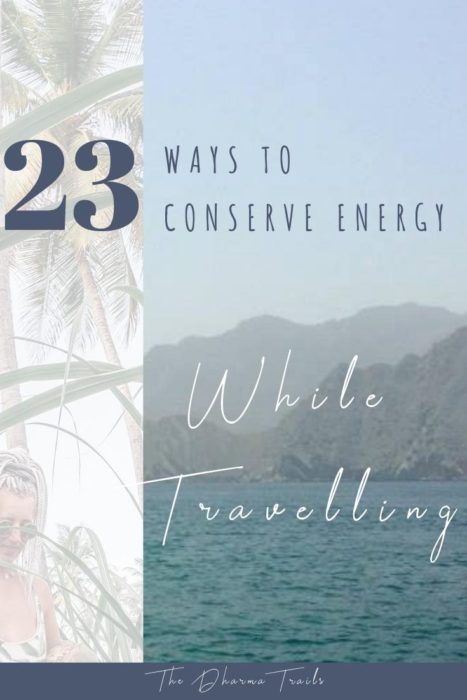
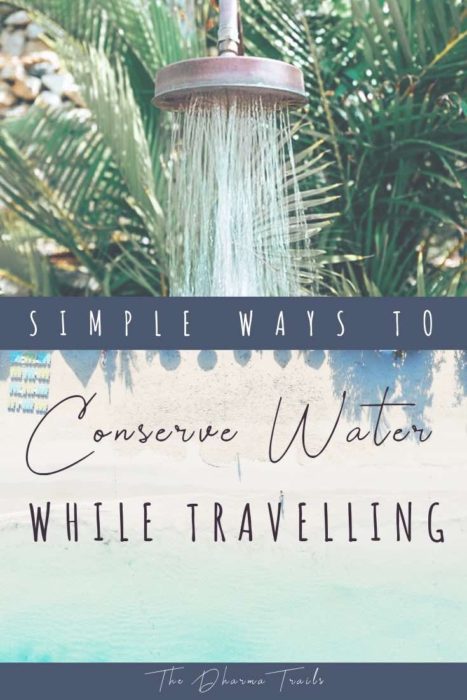
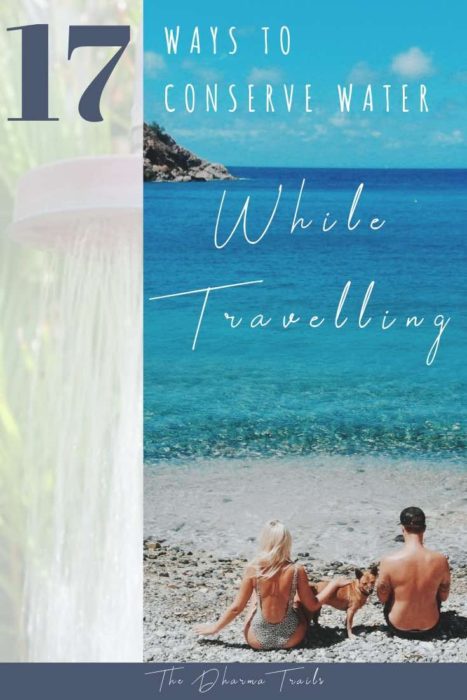

Aaron is one of the co-founders of The Dharma Trails. His background in marine eco tourism and writing have blended together to create the eco travel platform read by users around the world.

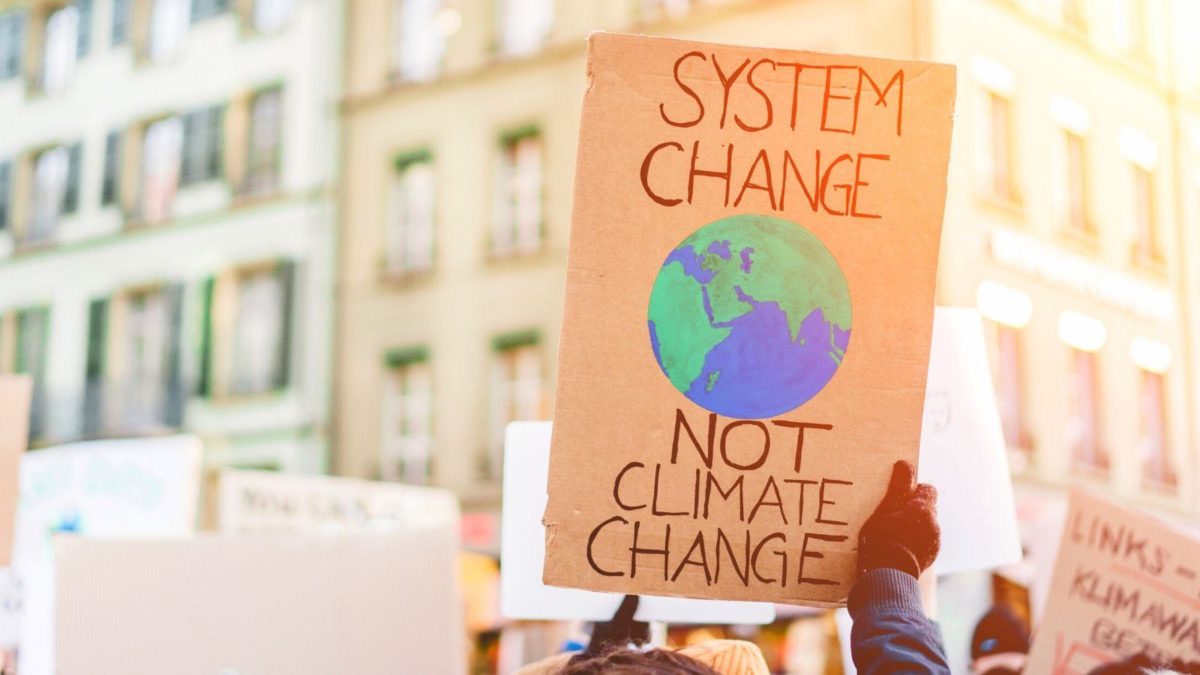
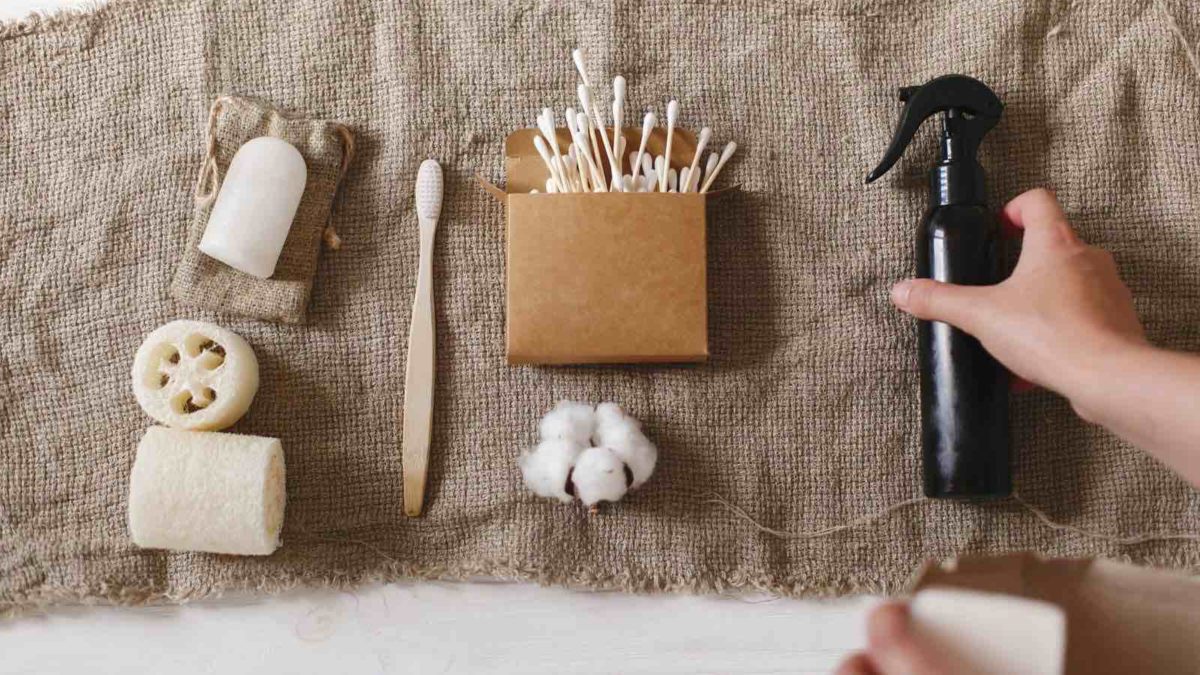
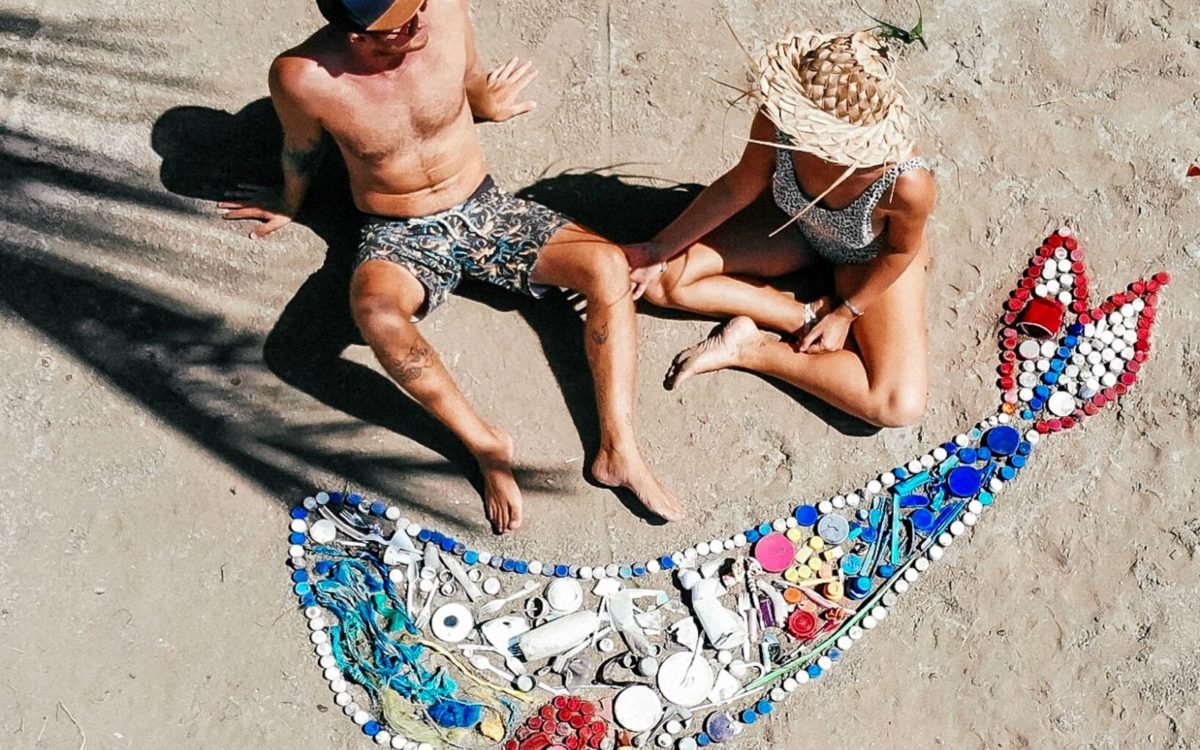
important for everybody – the effects of our existence will be measured in the future – Let’s keep and make the world of nature a better place for the next generations – Artificial intelligence might use lots of water to produce but might in the end use less resources. It starts with awareness.